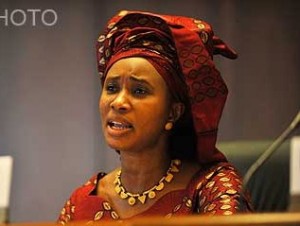 |
Managing Director BOI, Evelyn Oputu
|
Its General Manager, Operations, Joseph Babatunde said in a report that the funds comprised Central Bank of Nigeri’s (CBN’s) N235 billion Refinancing/Restructuring Fund (RRF) of commercial banks’ loans to the SMEs sector and N300 billion Power and Aviation Fund (PAIF). Both were okayed by the Federal Government in 2011.
He said of the RRF’s, N229.18 billion was disbursed in March, adding that it was targeted at refinancing commercial banks’loans to SMEs in the manufacturing sector. The fund, he explained, is expected to enhance the liquidity of commercial banks and facilitate more credits to the real sector.
According to him, the loans were given at seven per cent interest rate per annum with up to 15 years tenor and allows for additional working capital and supplementary plant and machinery.
He said so far, 23 commercial banks and one DFI participated in the scheme while over 525 companies have benefited from the scheme.
Babatunde disclosed that cumulative turnover of the obligors increased from N2.972 billion per annum before intervention to N5.55 billion after intervention adding that direct employment by beneficiaries increased from 86,513 before intervention to 130,143 after intervention representing an increase of 50.4 per cent.
For the PAIF, over N208.21 billion was disbursed with the loans approved at seven per cent interest rate per annum with tenor up to 15 years. He said the fund has assisted in providing about 747.7 mega watts (MW) of electricity representing about 18.7 per cent of the current power generation of about 4,000 MW.
He said the scheme has been able to leverage private investment into the Nigeria power sector adding that beneficiaries have been able to increase their investment in other assets or expanded their revenue base as a result of the lower debt obligations.
According to him the fund is meant for refinancing of commercial banks’ exposures to companies in the Power and Aviation sectors of the economy as well as assisting in the development of the sectors by improving terms of credit to operators. The fund, he said, has assisted in the establishment of new power plants especially in clusters and provided leverage for additional private sector investments in the power and aviation sectors
He said through increased advocacy by institutions, such as BoI, commercial banks and members of the Organised Private Sector (OPS) both federal and state governments are improving the investment climate and putting measures in place to address identified constraints business.
He recalled that BoI was established in October 2001 following the reconstruction of the first Nigerian Development Finance Institution (DFI), the Nigerian Industrial Development Bank Limited (NIDB). NIDB was established in 1964 under the guidance of the World Bank with the International Finance Corporation (IFC) holding 75 per cent equity and producing the first Managing Director. The equity structure was diluted in 1976 as part of the Indigenisation Decree.
BoI’s vision is to be a leading self-sustaining Development Finance Institution (DFI), operating under sound management and banking principles that would promote the emergence and development of a virile competitive industrial sector in Nigeria. He said the core mandate of the BoI is to provide financial assistance for the establishment of large, medium and small projects; as well as expansion, diversification and modernisation of existing enterprises; and rehabilitation of ailing industries.
He said the bank’s mission is to transform Nigeria’s industrial sector and integrate it into the global economy by providing financial and business support services to existing and new industries to attain modern capabilities to produce goods that are competitive in both domestic and external markets.
He said the Ministry of Finance has 59.54 per cent shares in the bank; Central Bank of Nigeria has 40.36 per cent equity while private shareholders have 0.10 per cent shares.
He however, lamented the prevalence of insincerity and poor loan repayments attitude among loan beneficiaries as well as lack of credible and reliable credit, business and market information that serves the needs of both the potential borrowers and financial institutions. There is also dearth of bankable projects in some parts of the country due to poor entrepreneurial skills and limited human capital.
Babatunde said that in all the transactions, the emphasis is on prudent project selection and management. He said the bank is committed to supporting quality projects with high developmental impact such as job creation and poverty alleviation to enhance the socio-economic standard of Nigerians.
Source: The Nation
No comments:
Post a Comment